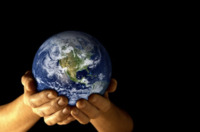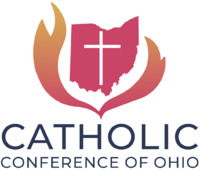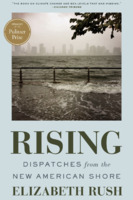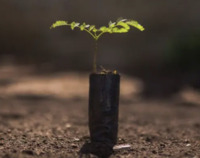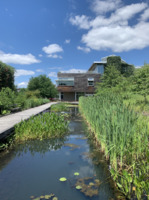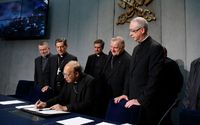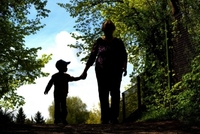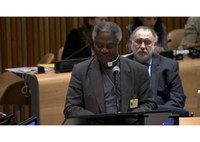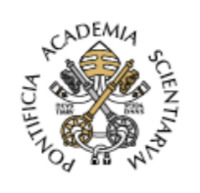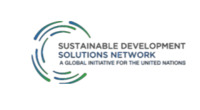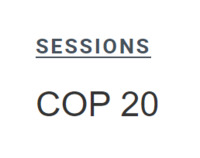Search
263 items
-
Turning Around Our Relationship with Earth is a Teshuvah Project
The author recounts an unsettling encounter with a utility worker who downplayed the environmental harm of her gas leak. From here, she explains the true negative impacts of methane emissions on both people and the climate, and encourages us to act in a way that "turns around our relationship with Earth". She connects this with the Jewish tradition of Teshuvah, the time in between Rosh Hashanah and Yom Kuppur meant for repentance. -
Care for Creation - Catholic Conference of Ohio
"The Catholic Bishops of Ohio invite you to study the issues related to the stewardship of God’s creation. Care for the environment is a fundamental principle within Catholic Social Teaching. We applaud efforts already underway in many Catholic homes and institutions that help conserve energy, protect the environment, and advance a greater understanding of faithful stewardship. We hope that Catholic families and institutions around the state will continue in such efforts."
This resource includes a statement calling to care for God's creation and contains information and links to several other resources related to religion and environmentalism. -
Al-Mizan: Covenant for the Earth
"The Covenant presents an Islamic outlook on the environment in a bid to strengthen local, regional, and international actions to combat the triple planetary crises defined by the United Nations as climate change, biodiversity loss and pollution. It is a global endeavour to engage Muslims from all levels of society in the development and adoption of this call...
Al-Mizan - A Covenant for the Earth is a restatement of the principles governing the protection of nature in a form that meets current challenges. It examines the ethics behind the social patterning of human existence and enquires into how they could be brought to life today working in harmony with the heartbeat of the natural world." -
Rising: Dispatches from the New American Shore
This resource contains a series of vignettes following Elizabeth Rush as she meets people all around American who have been affected in some way by global sea rising, as well as some of her own personal experiences. She gives voice to those otherwise not heard, and shares eye opening testimonials from those who experience the effects firsthand. -
Plant With Purpose
Plant With Purpose works to restore forests by planting trees in the most devastated and vulnerable parts of the world. They do this because they view the issues of global poverty and environmental damage as interconnected. -
Center for Sustainable Landscapes
First Place Winner of the Sustainability Photo Contest
"This inspiring image shows the Center for Sustainable Landscapes (CSL) at PHIPPS Conservatory and Botanical Gardens. Not only does this picture show the beauty that nature provides for the built environment, but the building itself is a wonderful example of what success in sustainable development looks like. The CSL has achieved an abundance of green certifications including LEED Platinum, SITES Platinum, WELL Building Platinum, BREEAM Outstanding In-Use Building, etc. The building is completely net-zero and prioritizes sustainable practices such as renewable energy and rainwater collection. This photo perfectly exemplifies how sustainability can be represented in the urban landscape." Taken by Kelsey Frantz. Submitted to the RESTORExchange Sustainability Photo Contest. -
Take Shelter Here
"This is a picture of a cave in Chillagoe, a town in Queensland, Australia. My study abroad group learned that Indigenous people used to take shelter here, and there are still some art on the walls. Also, the caves are made from limestone, which is made from coral, which means this whole area was once a shallow ocean that was compressed and pressurized over time. The connection between people using the caves as shelter and the vast amount of history connects to sustainability because of how it all ties together. I care about these caves because it’s proof of how the environment continues to change and evolve, and how people continue to properly use and maintain it. From oceans for fish to shelter for the Indigenous people to an educational tool for us, the environment always provides and we should continually work to preserve it." Taken by Shreya Mishra. Submitted to the RESTORExchange Sustainability Photo Contest. -
A Jewish Response to Environmental Stewardship: LEEDing the Way
The article highlights Temple Israel of Minneapolis's achievement of LEED Gold Certification, reflecting their commitment to sustainability through a multi-year renovation project. This accomplishment aligns with their Jewish values, particularly the principle of Pikuach Nefesh, which emphasizes protecting life and the environment. The synagogue's efforts extend beyond their building to include community-wide initiatives such as climate action resource fairs and partnerships with environmental organizations. Their ongoing commitment to sustainability is showcased through continuous improvements and active participation in broader climate justice movements. -
In Threatened Island Nation, Pope Hears Plea for Climate Action
Pope Francis visited Papua New Guinea, a Pacific Island nation facing serious environmental issues including water pollution, sea level rise, and deforestation. This continued his involvement in the discussion on climate change as he met with governor general Bob Dadae and spoke at meetings. The article covers the Pope's visit, the environmental challenges facing Papua New Guinea, and the ties between religious positions and care for the environment and people who are affected by climate change. -
How Religion Influences Our Relationship With the Environment
The article shows how religious change can effect trends in the environment and how it can produce better environmental conditions attitudes. It lists statistics on which countries have certain environmental issues and how religion may play a role in certain situations. -
5 reasons why people of faith are a powerful force in the fight against climate change and environmental crises
This article is from the environmental outreach group Greenpeace. It highlights why religious groups globally have a powerful voice in climate justice. It is a digestible first article if you want to familiarize yourself with religious environmental activism. -
Engaged Organizations: Columban Center for Advocacy and Outreach
Columban Center for Advocacy and Outreach serves as a line of communication between Columban missionaries and policy makers in Washington D.C. Missionaries are stationed in 16 countries around the world, bringing attention to environmental justice issues that are most pressing for marginalized populations in the areas. Their primary focus is combating human-induced climate change. In addition, they advocate for sustainable development and agricultural systems, and right to clean water. -
Islamic Declaration on Climate Change
In August of 2015, faith leaders, senior international development policy makers, academics and other experts announced an Islamic Declaration on Climate Change at an International Islamic Climate Change Symposium in Istanbul. The United Nations Framework Convention on Climate Change posted the following statement on their website:
"The leaders called on governments meeting in Paris to 'bring their discussions to an equitable and binding conclusion' bearing in mind:
The scientific consensus on climate change, which is to stabilize greenhouse gas concentration in the atmosphere at a level that would prevent dangerous anthropogenic interference with the climate systems; The need to set clear targets and monitoring systems; The dire consequences to planet earth if we do not do so; The enormous responsibility the COP shoulders on behalf of the rest of humanity, including leading the rest of us to a new way of relating to God’s Earth." -
Interfaith Declaration on Climate Change
Interfaith Declaration on Climate Change posted a declaration on climate change (http://www.interfaithdeclaration.org/) as well as their organizational vision on their website:
"Our vision is to repeat the message over and over that the religions of Earth stand as one behind strong and immediate limits to climate changing emissions of ‘greenhouse gasses’, predominantly CO2. Our vision is to take this message to each remaining session of the climate negotiations in Bangkok, Barcelona and Copenhagen, each time with different religious leaders, and to make the unified stand of widely divergent and differing faiths and beliefs into newsworthy events.
Won’t you please help us to realize this vision by endorsing our Interfaith Declaration on Climate Change and urging all your contacts to do so as well. Especially we need the endorsements of religious leaders and organizations representing many people. Our Interfaith Declaration will be presented to Ban Ki-moon in November to be carried by him to the climate negotiations in Copenhagen in December. Let us see that it is signed by representatives of all the major religions of Earth, and that it carries an unmistakable mandate to the negotiations itself." -
Sikh Faith Statement on the Environment
This Sikh faith statement on the environment, based on the 1995 Windsor Statements, is posted on the Interfaith Center for Sustainable Development. Below is the introduction to the statement:
"The Sikh scripture, Guru Granth Sahib, declares that the purpose of human beings is to achieve a blissful state and to be in harmony with the earth and all creation. It seems, however, that humans have drifted away from that ideal. For the earth is today saturated with problems. It is agonizing over the fate of its inhabitants and their future! It is in peril as never before. Its lakes and rivers are being choked, killing its marine life. Its forests are being denuded. A smoky haze envelops the cities of the world. Human beings are exploiting human beings." -
Anglican Views on Climate Change - a report compiled by the Climate Institute of Australia
Interfaith Center for Sustainable Development posted a report, compiled by the Climate Institute of Australia, on Anglican views of climate change. A predominant them includes the toll that greed and selfishness takes on God's creation. It focuses on specific actions that individuals can take to reduce energy usage and foster environmental justice for the world population. -
Catholic Views on Climate Change - a statement from the Catholic Bishops of Australia
The Catholic Bishops of the Climate Institute, Australia created a statement on climate change. The statement emphasizes various responsibilities of individuals and entities that are necessary to provide a safe and healthy environment for all parts of the world. They also warn against further ecological destruction for future generations. -
World bishops' appeal to COP 21 negotiating parties
In preparation for the 2015 United Nations Negotiations in Paris, the heads of Catholic bishops' federations on every continent issued a joint appeal to COP 21 delegates that they produce a "comprehensive and transformational agreement" to address global climate crisis. Salient themes include the challenges and opportunities of climate change, and sustainable development to benefit the poor. They also call for leaders to become motivated to work towards enforceable agreements. -
Remarks by Cardinal Peter K. A. Turkson on the Encyclical Laudato si’ to Child-Focused Agencies
Cardinal Peter K. A. Turkson addressed child-focused agencies at UNICEF House on June 30, 2015. His message is about the relevance of Laudato si' encyclical with regard to children and our common home. He urges individuals to contemplate the negative impact of climate change and how this will impact the future for our children. -
Statement by Cardinal Peter K. A. Turkson at the High Level Event on Climate Change
Cardinal Peter K. A. Turkson provides a statement on climate change at the United Nations High Level Event on Climate Change on June 29, 2015. He emphasizes that the plight of the poor and the fragility of the planet are intimately related. As stewards of the Earth, he therefore greatly urges individuals to make courageous choices in order to reverse the trend of global warming. -
Climate Change and the Common Good: A Statement of the Problem and the Demand for Transformative Solutions
The Pontifical Academy of Social Sciences prepared the following statement on climate change. It covers a wide range of associated sustainability issues. Various suggestions for societal interventions are also included within the statement. -
Declaration of Religious Leaders, Political Leaders, Business Leaders, Scientists and Development Practitioners
Business and political leaders, and scientists from around the world have congregated at the Pontifical Academies of Sciences and Social Sciences to address the climate change crisis. The introduction to the declaration is stated below:
"We the undersigned have assembled at the Pontifical Academies of Sciences and Social Sciences to address the challenges of human-induced climate change, extreme poverty, and social marginalization, including human trafficking, in the context of sustainable development. We join together from many faiths and walks of life, reflecting humanity’s shared yearning for peace, happiness, prosperity, justice, and environmental sustainability.
We have considered the overwhelming scientific evidence regarding human-induced climate change, the loss of biodiversity, and the vulnerabilities of the poor to economic,social, and environmental shocks." -
Catholic Bishops' statement in Lima on the road to Paris
During the High-level event at the COP20 in Lima, Bishops from around the world called for a fair and legally binding climate agreement to be signed at the COP21 in Paris, 2015. One segment of the introduction is shown below:
"Following the evangelical option for the poor, we work closely with the most vulnerable communities and the excluded and as such are closely attuned to how the problem of climate change is affecting them. Our message to political leaders and all people of good will is rooted in the experience and suffering of these poor communities.
Humankind on the Planet Earth is ordained to live in equity, justice and dignity, peace and harmony in the midst of the order of Creation. Humankind is ordered to treat respectfully Creation, which has a value in itself. We Catholic Bishops recognize the atmosphere, rainforests, oceans and agricultural land as common good that require our care." -
Address at the United Nations Climate Change Conference given by H.E. Archbishop James Patrick Green
H.E. Archbishop James Patrick Green provides a statement on the impact of climate change on poverty at the United Nations Conference in Lima, Peru on December 10, 2014. He discusses the interdependence of humans and the Earth. He emphasizes Pope Francis's call for intervention to fight against global warming in order to protect the planet and, in particular, those at the poverty level. -
Message of His Holiness Pope Francis on the Occasion of the 20th Conference of the Parties to the United Nations Framework Convention on Climate Change
Pope Francis's statement on climate change was issued at the High Level segment of the United Nations Climate Change Conference on December 10, 2014. The introduction to the Holy See's message is stated below:
"At this very decisive moment in the history of climate negotiations we have to come to the point where we must overcome inaction. As Pope Francis said in his Message to our Conference, the issues we are debating 'affects all humanity, especially the poor and future generations: […] it is a serious ethical and moral responsibility […] There is a clear, definite and urgent ethical imperative to act […] We can only find adequate solutions if we act together.'
The longer we wait, the more it will cost; more victims will suffer from our inaction and the greatest weight will fall on the most vulnerable, the poorest peoples and future generations: what is at issue here is respect for their fundamental human rights."

